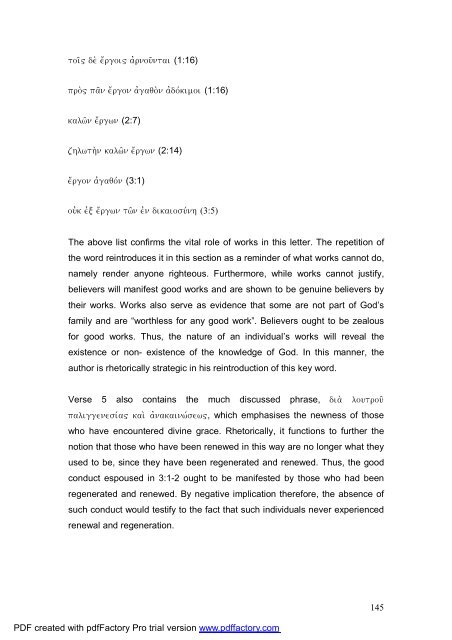A Text centred rhetorical analysis of Paul's Letter to Titus
A Text centred rhetorical analysis of Paul's Letter to Titus
A Text centred rhetorical analysis of Paul's Letter to Titus
You also want an ePaper? Increase the reach of your titles
YUMPU automatically turns print PDFs into web optimized ePapers that Google loves.
<strong>to</strong>i`" de; e[rgoi" ajrnou`ntai (1:16)<br />
pro;" pa`n e[rgon ajgaqo;n ajdovkimoi (1:16)<br />
kalw`n e[rgwn (2:7)<br />
zhlwth;n kalw`n e[rgwn (2:14)<br />
e[rgon ajgaqovn (3:1)<br />
oujk ejx e[rgwn tw`n ejn dikaiosuvnh (3:5)<br />
The above list confirms the vital role <strong>of</strong> works in this letter. The repetition <strong>of</strong><br />
the word reintroduces it in this section as a reminder <strong>of</strong> what works cannot do,<br />
namely render anyone righteous. Furthermore, while works cannot justify,<br />
believers will manifest good works and are shown <strong>to</strong> be genuine believers by<br />
their works. Works also serve as evidence that some are not part <strong>of</strong> God’s<br />
family and are “worthless for any good work”. Believers ought <strong>to</strong> be zealous<br />
for good works. Thus, the nature <strong>of</strong> an individual’s works will reveal the<br />
existence or non- existence <strong>of</strong> the knowledge <strong>of</strong> God. In this manner, the<br />
author is <strong>rhe<strong>to</strong>rical</strong>ly strategic in his reintroduction <strong>of</strong> this key word.<br />
Verse 5 also contains the much discussed phrase, dia; loutrou`<br />
paliggenesiva" kai; ajnakainwvsew", which emphasises the newness <strong>of</strong> those<br />
who have encountered divine grace. Rhe<strong>to</strong>rically, it functions <strong>to</strong> further the<br />
notion that those who have been renewed in this way are no longer what they<br />
used <strong>to</strong> be, since they have been regenerated and renewed. Thus, the good<br />
conduct espoused in 3:1-2 ought <strong>to</strong> be manifested by those who had been<br />
regenerated and renewed. By negative implication therefore, the absence <strong>of</strong><br />
such conduct would testify <strong>to</strong> the fact that such individuals never experienced<br />
renewal and regeneration.<br />
PDF created with pdfFac<strong>to</strong>ry Pro trial version www.pdffac<strong>to</strong>ry.com<br />
145

















